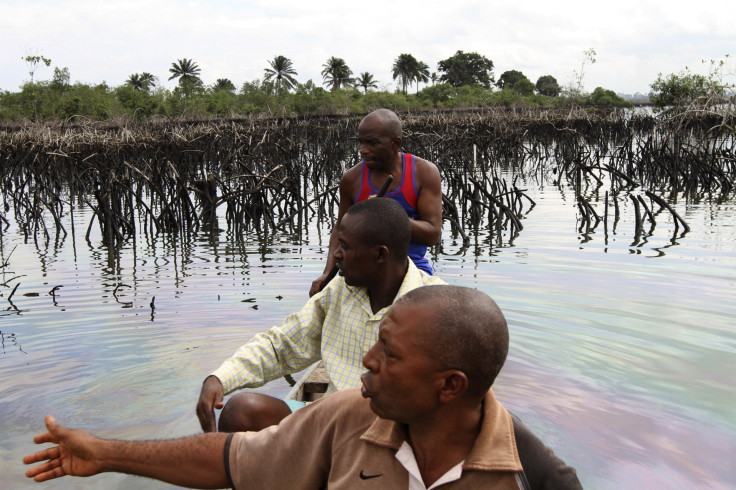Five Years After Devastating Oil Spills In Nigeria, Shell May Finally Cough Up Millions

It has been five years since two massive oil spills polluted the swampy, oil-rich region of southern Nigeria. But, to this day, dull gray water with a rainbow sheen still courses through streams and rivers. Fish still die. Fumes still fill the air.
After this week, some of the people most affected by the spills may finally get their due. Anglo-Dutch oil giant Royal Dutch Shell (NYSE:RDS.A), the company whose burst pipelines created this mess in 2008 and 2009, is meeting with leaders of Nigeria's Bodo community in order to reach a settlement.
Talks began Monday in the southern city of Port Harcourt. A London law firm, Leigh Day, is representing members of the Bodo community, which has a population of more than 30,000 and depends on subsistence farming and a once-thriving fishing industry.
Discussions will focus on the extent of financial losses endured by the claimants as a result of the spills five years ago, but both sides dispute the size of the leaks. Shell accepts liability but maintains that only about 4,000 barrels of oil spilled into the area. Leigh Day cites independent analysts who put the figure closer to 600,000 barrels.
Both sides are officially silent about the size of the settlement being negotiated, but The Guardian reports that Shell may be offering $20 million while the Bodo community is angling for $200 million. Leigh Day, which first filed suit against Shell in 2012, is pushing hard for a resolution that will favor the Bodo population.
"It is entirely depressing that one of the largest companies in the world is acting like the playground bully, trying to batter local people whose lives have been devastated, into submission," said Martin Day, the lawyer representing the claimants. "We will be doing our damnedest to ensure that Shell pay out a fair amount for the damage they have caused and put the Bodo Creek back into its pre-spill state."
The Shell website devotes plenty of verbiage to its presence in Nigeria, explaining that the company's operations enriched the government to the tune of $38 billion between 2007 and 2011. The website also alludes to political difficulties and oil spills, and has records of all leaks that have occurred since 2011. But, it says nothing about the 2008 incident, which has been the source of a major controversy over the past five years.
Shell also contends that most spills and leaks cannot be blamed on the company itself. Indeed, the region is prone to oil theft and sabotage on an industrial scale, which has brought production down to a four-year low of 1.9 million barrels a day this summer and costs the government billions of dollars annually.
"The most significant environmental damage from oil and gas operations in the Niger Delta is through sabotage of facilities resulting in oil spills," according to Shell. "The spills are often made worse because communities sometimes deny access to verify the spill and stop the cause of the leak. In the last five years some 70 percent of all oil spills have been the result of sabotage. Whatever the cause, [the company] is committed to cleaning up spills and remediating the land."
But Shell's responses to oil spills have been a source of contention since long before 2008.
The Center for Constitutional Rights, a non-profit advocacy group based in New York, claims that "an estimated 1.5 million tons of oil has spilled in the Niger Delta ecosystem over the past 50 years. This amount is equivalent to about one 'Exxon Valdez' spill in the Niger Delta each year."
A 2011 report from the United Nations suggests that a full clean-up operation, which would address spills and leaks from pipelines owned by a range of oil companies including Shell, California-based Chevron (NYSE:CVX) and France's Total (NYSE:TOT), would cost about $1 billion and take up to 30 years.
At the heart of these disputes are societal problems within Nigeria. The country boasts the second-largest economy in all of Africa with GDP per capita of $1,555, but a yawning wealth gap has left more than half the population -- Africa's largest at 170 million -- living beneath the poverty line.
Nigerian dissidents have long criticized the government for failing to turn oil revenues into broad-based growth, and companies like Shell -- which has been blamed for working with the government by helping to fund efforts to quell dissent -- are often implicated along with the administration.
It is significant that Shell is finally addressing the 2008-2009 spills in earnest, but the broader picture remains bleak. Oil revenues continue to enable corruption in Nigeria's capital city of Abuja, and communities without high-profile legal representation still struggle to make their voices heard.
And, even $200 million from Shell may not be enough to erase the years of difficulties, environmental damage and interrupted livelihoods that oil pollution has caused over the past several decades in the country. But, for the tens of thousands of people who make a living in the Niger Delta, it's a start.
© Copyright IBTimes 2024. All rights reserved.




















